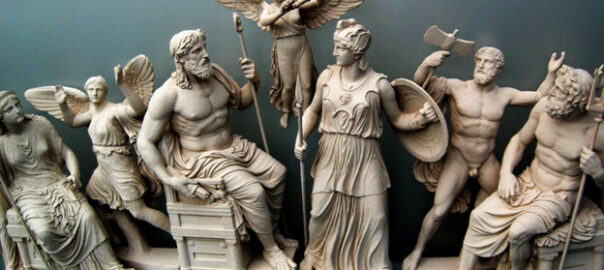
Greece:
Religious Life in the Greek Axial Age (Part 1)
Greek religion was part of the attempt to reinforce a common sense of purpose, civic cohesion, and community. Faith was a private matter, whereas religion was a public affair enacted for the good of all.
As we saw in pre-Axial Greece, to the Greeks religion was not doctrinal, but a way of living. There was no sacred text, so there could be no profession of faith measured against it. As Hugh Bowden, ancient history professor of Kings College London points out:
“The relationship between mortals and gods was characterized above all by ignorance. Writers from Homer onwards emphasized that the gods were invisible to mortals; prayers addressed to gods ‘whoever you might be’ are expressions of a genuine uncertainty about what the supernatural powers were like. It was sometimes possible to receive information from the gods, most obviously through divination, but the gods were parsimonious in what they would divulge, and divination was not used to ask questions about the nature of the gods, but to seek advice for immediate concerns. This ignorance extended to the issue of what the gods looked like: anthropomorphism was not a belief, but rather a provisional way of talking about the gods.”
The sole requirements for the Greeks were to believe that the gods existed and to perform ritual and sacrifice, through which the gods received their due. To deny the existence of a deity was to risk reprisals, from the deity or from other mortals. If a Greek went through the motions of piety, he risked little, since no attempt was made to enforce orthodoxy, a religious concept almost incomprehensible to the Greeks.
Faith was a private matter, whereas religion was a public affair enacted for the good of all. Each city-state had its own patron deity who influenced how local citizens saw themselves and understood their relationship to outsiders. Communities adapted the myths of their patron deity to suit their purposes, so stories about Athena (originally a Minoan deity), the patron goddess of Athens, were told in one way in Athens and in another outside her boundaries, in Corinth or Sparta, for example.
Greek legends, myths and rituals were performed in public and attended as part of a Greek’s religious obligation, providing cohesiveness to the political community. As Greece prospered, so did their religious rituals. Wealthier cities began to host larger and larger celebrations that incorporated an ever-widening audience. There was always a religious element to these celebrations, even if the dominant theme appeared to be something else – such as theatrical or athletic competitions.
Greek religion in its developed form lasted more than a thousand years, from the time of Homer (thought to be 9th or 8th century BCE) to the reign of the Roman emperor Julian (4th century CE). During that period its influence spread as far west as Spain, east to the Indus River, and throughout the Mediterranean world. The Romans identified their deities with those of the Greeks; the stories and images of Christian saints and heroes echo the actions, values and images of the heroes and deities of the ancient Greek world.

